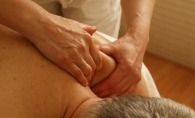With rising health care costs and a population of baby boomers who aren’t getting any younger, the role of consumer education and preventive care for Edina’s senior citizens is more important than ever. While Fairview Southdale Hospital has long been recognized for its world-class stroke, heart and cancer care, it is also providing people in the community with information and resources to learn about, and prevent, conditions that would take them through the hospital doors. Vascular HealthSeveral times each year, Fairview Southdale hosts seminars in its International Room, free and open to the public, on topics related to vascular health and medicine. “The primary benefit to having these programs is consumer awareness,” says Dr. Christopher Roland, medical director of the vascular program at Fairview. “They allow us to show people what the operations are like and to give them a better sense of what options are out there.”Far from being a presentation to a passive audience about medical procedures, these seminars afford attendees the chance to be screened for various health conditions and ask questions of the physicians or, if necessary, have a private conversation with them.The programs benefit the community and potential patients, but, Roland explains, the physicians like them too, because the seminars give them a chance to connect with and educate the community and share their knowledge.“By providing them with information like this, we can spend more time working with them on risk factors and reducing the risk,” he says.Edina resident Mitzi Wicklund has participated in multiple programs offered by the vascular specialists at Fairview. “It was so nice to have the doctor right there, available for questions,” she says. “And it was much more informal than a regular visit to the doctor—more educational and not as intimidating.”Roland says that Fairview Southdale is also promoting additional services including vascular health and vein solutions as well as vascular health and orthopedics. In November, the hospital will take its programming to the Hotel Sofitel, where more space will help accommodate more people. Women’s Heart Health ClinicMost people associate heart disease with men, while women are considered more likely to develop breast cancer.“What people don’t know,” says Kate Moody, a Physician Assistant at UMPhysicians Heart at Fairview Southdale, “is that heart disease is the leading cause of death among women, too. And even though we live in this well-educated market, and a really physically fit area where people go the gym and shop at the farmers’ market, they don’t necessarily know.”Moody works in the Women’s Heart Clinic at Fairview along with cardiologist and clinic founder Dr. Jennifer Dankle. The function of the clinic is to call attention to some of the misunderstandings that exist about women and heart disease, and to make sure women have the education, resources and care that they need.“For minimal cost—and it doesn’t matter if they have insurance—women can come to the clinic for two appointments,” Moody says. In the first appointment, women get their lab work done—blood sugar, cholesterol panels, EKG—then have a consultation about their medical history. A week later, patients return to discuss lab results and meet with a nutritionist about dietary choices they can make, depending on their individual risk factors, that will promote good heart health.“It is a much more personal approach,” says Moody. “And so much less expensive than getting all the lab work done with a primary care physician.”One surprising fact is that more and more young women—in their 30s and 40s—are being diagnosed with heart disease. These women face a unique set of challenges, among them, balancing their illness with a career and raising children. To serve this particular demographic, Fairview has created a support group that meets on the second Wednesday of every month.“Young women in our community—they want to know more,” says Moody. “Each meeting has various topics to discuss, and usually, there is a speaker.”Stroke SurvivorsFew health events upset the rhythm of everyday life in the way that a stroke can. Sophia Bailey, a neuroscience nurse at Fairview, leads two groups that support the needs of stroke victims and their caregivers.Her monthly “Life in Bloom” group, led by a speech and language pathologist, is designed specifically for people who want support with the myriad communication-related issues that can arise for those who have had a stroke. Each month, Bailey says, about 30 or 40 people attend.The second group called “Stroke Thrivers” meets monthly and is a more general support group at which a variety of topics related to stroke are presented, including heart health, depression and nutrition.Even more important than the information that patients and caregivers can get from these gatherings, says Bailey, is the company. “Because of rising costs, the average stay in the hospital is three to five days. That’s pretty short. Much of their healing has to happen outside of the hospital.” And being with others who have experienced something similar can be a big part of that healing process.Anecdotally, (as yet there’s no research to back her claims up) Bailey says that the patients who regularly attend the groups and get support from others heal more quickly and more fully.Weight LossObesity is, quite literally, a huge problem in America. Nearly two-thirds of Americans are overweight and up to 65 percent are considered obese. For those in the local community who struggle with obesity and are motivated to make changes, the weight loss clinic at Fairview Southdale can help support them.Twice monthly, during the day and evening, the clinic offers informal information sessions to anyone who is interested. Presented by physicians, these sessions educate attendees about the different treatment options, from lifestyle changes to medications to surgery. Each session attracts, on average, 15 to 20 attendees, meaning that Fairview potentially reaches up to 500 people each year.Dr. Paul Benn, medical director of the weight loss clinic, says that the aim of the session is “to be as non-threatening and nonjudgmental as possible. Many people who struggle with their weight have tried everything and have faced their share of ridicule. We know that the path to weight loss is not easy for anyone. But we believe that weight loss is possible for everyone.”In addition to the direct-to-consumer program by the weight loss clinic, Benn and his team regularly share the latest findings in weight-loss medicine with his medical colleagues in other clinics. “There are a lot of new developments—medications that become available, new findings—and we want other people who serve the community to be informed,” he says.The clinic also offers online weight loss seminars to educate possible candidates for weight loss surgery about the options and risks, and the importance of lifestyle management after surgery. The team has also put patients’ success stories online, so that people can read about those who have walked the difficult path of weight loss before them.
Menu
From the September 2013 issue
Fairview Southdale Contributes to a Healthy Community
Fairview Southdale programs, groups and events contribute to a healthy community.
Dr. Jennifer Dankle (right) speaks to Women Heart Support group members.
Photo by:
Photo courtesy of Fairview Hospital









